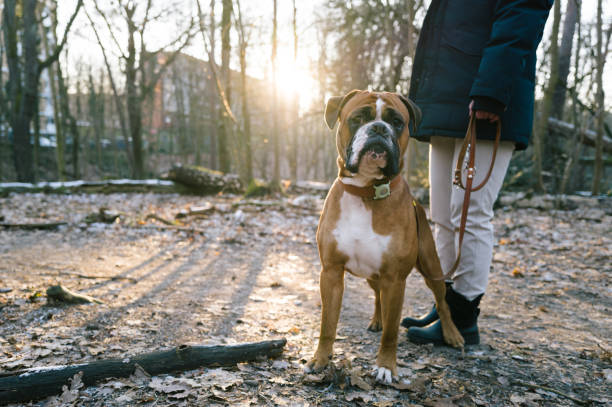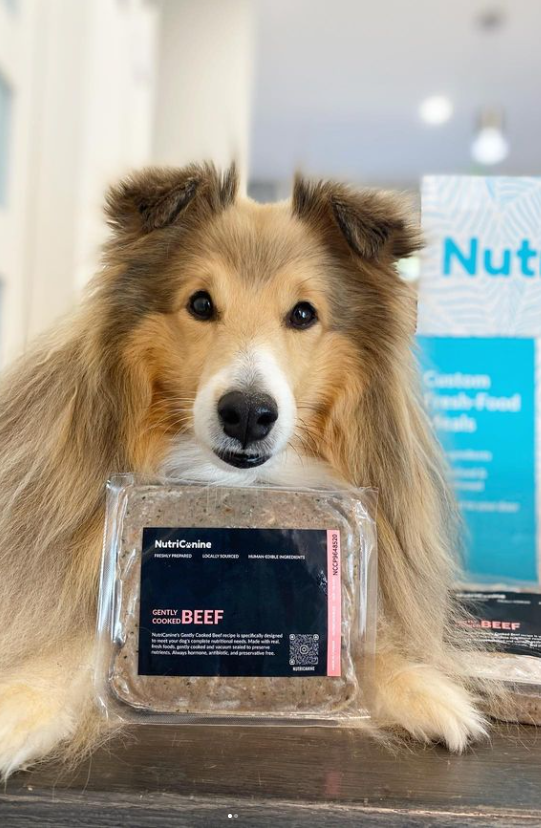“I have three pups, all picky eaters, and they devoured their meals! I’m so happy to have found a quick, easy and super healthy food.”
Quick Stats About the Boxer

Height 21.5–25 inches

Weight 50–80 lbs
Lifespan 10–12 years
Energy level High
Shedding Moderate
Grooming Low maintenance
Get a custom meal plan designed specifically for your Boxer
Get StartedBoxer: Everything You Need to Know


The Boxer is a high-spirited, athletic, and affectionate breed known for its boundless energy and love of play. Originating from Germany, Boxers were originally bred for hunting and protection, giving them a strong, muscular build and alert personality. Despite their powerful physique, Boxers are famously affectionate with family, including children, making them excellent family dogs. They thrive on human interaction and require regular exercise and mental stimulation to stay happy and healthy. Their short coat is low-maintenance, though they do shed moderately throughout the year. With proper training, Boxers are incredibly loyal and can be both gentle companions and effective watchdogs. Their high intelligence means they respond well to positive reinforcement training, but they can be a bit stubborn at times. Boxers are also known for their goofy personalities and expressive faces, which often seem to mimic human emotions. Because of their energetic nature, they require a balanced diet to support muscle development, joint health, and digestion. Choosing the right food for a Boxer is essential—especially one that supports their active lifestyle from puppyhood through to their senior years.
Create the Perfect Meal Plan for Your BoxerCharacteristics and Care
Appearance
Boxers are medium to large-sized dogs with a strong, muscular build and a square, athletic frame. Their short, smooth coat lies close to the body and typically comes in fawn, brindle, or white, often with distinctive white markings on the chest and face. Boxers are easily recognized by their expressive, wrinkled foreheads, dark soulful eyes, and strong jaw. Their proud, upright posture and alert stance reflect their confident, energetic nature. Overall, Boxers have a balanced, agile appearance that speaks to both power and playfulness.
Temperament
Boxers are affectionate, fun-loving, and fiercely loyal to their families. They're often called “eternal puppies” because of their playful and energetic personality that sticks with them well into adulthood. They are patient and gentle with children, protective without being aggressive, and naturally sociable with people and other dogs when properly socialized. While Boxers can be a little stubborn, they’re incredibly intelligent and eager to please—especially when there's praise or a treat involved. Their alertness and natural guarding instincts also make them excellent watchdogs.
Grooming
Boxers are relatively low-maintenance when it comes to grooming. Their short coat requires minimal upkeep—weekly brushing is typically enough to remove loose hair and keep their coat shiny. They do shed, especially during seasonal changes, but not excessively. Boxers are generally clean dogs, but regular ear cleaning, nail trimming, and dental care are essential parts of keeping them healthy. Because they have short coats and minimal body fat, Boxers are sensitive to temperature extremes and should be kept warm in winter and cool in summer.
Training & Exercise
Boxers are energetic and intelligent, which makes training both important and rewarding. Early socialization and obedience training are highly recommended, as their strong personalities can sometimes lead to stubbornness. Positive reinforcement techniques work best with this breed. In terms of exercise, Boxers need plenty of physical activity every day. Long walks, interactive playtime, and access to safe off-leash areas are great ways to keep them stimulated. Without adequate exercise, Boxers can become bored and develop destructive behaviors—so active families are a perfect match for this breed.
What Makes a Boxer Unique
Boxers are a one-of-a-kind blend of strength, spirit, and silliness. What sets them apart most is their playful, puppy-like nature that lasts well beyond their early years—they’re known to bounce around with joy even as adults. Their expressive faces and human-like eyes make it easy to understand what they’re feeling, creating a strong emotional bond with their families. Boxers are also incredibly loyal and naturally protective, which makes them trustworthy companions and vigilant guardians. They’re agile and athletic, excelling in canine sports and physical activities that tap into their energy and intelligence. Despite their muscular appearance, they’re true cuddlebugs at heart and crave affection and closeness with their humans. Boxers are known for their "kid-friendly" demeanor, often becoming best friends with the children in the household. Their vocal range is surprisingly broad—Boxers don’t just bark, they “talk” in amusing growls, yips, and woofs to express themselves. They also tend to be sensitive and emotionally intuitive, often picking up on their owner's mood. This unique mix of physical power, emotional depth, and playful charm makes the Boxer an unforgettable companion.
Create a Meal Plan That Caters to Your Boxer’s Unique Needs

Health Considerations for Boxers
Boxers are generally healthy, active dogs, but like all breeds, they have certain predispositions to health conditions that owners should be aware of. A proactive approach to wellness—including regular vet checkups, proper exercise, and a balanced, nutrient-rich diet—can help manage or reduce the risk of many of these issues. Understanding the most common health concerns in Boxers is key to supporting their long-term health and happiness.
Hip Dysplasia
Although often associated with larger breeds, Boxers are also at risk for hip dysplasia—a condition where the hip joint doesn’t fit properly into the socket. This can lead to discomfort, reduced mobility, and arthritis over time. While genetics play a role, proper weight management and joint-supportive nutrients can reduce the risk or slow progression. Diets rich in omega-3s, glucosamine, and chondroitin can support joint health and reduce inflammation. Maintaining a healthy weight through portion-controlled meals is also key. NutriCanine’s tailored meal plans are designed to support optimal body condition for dogs like Boxers.
Bloat (Gastric Dilatation-Volvulus)
Boxers are a deep-chested breed, which puts them at higher risk for bloat—a serious and potentially life-threatening condition. Bloat occurs when the stomach fills with gas and can twist, cutting off blood supply. This condition often comes on suddenly and requires immediate veterinary attention. Feeding smaller, more frequent meals and avoiding vigorous activity after eating can help reduce risk. Choosing a highly digestible diet is also important to support healthy digestion. NutriCanine’s fresh, portioned meals can help regulate mealtime and reduce bloating risk.
Cardiomyopathy
Boxers are known to be genetically predisposed to a heart condition called Boxer cardiomyopathy, or arrhythmogenic right ventricular cardiomyopathy (ARVC). This disease affects the heart’s electrical system and can lead to irregular heartbeats or even sudden cardiac arrest. Regular veterinary screenings and early detection are crucial in managing this condition. A diet rich in taurine and omega-3 fatty acids can help support heart health. NutriCanine meals include heart-healthy ingredients like fish oil and lean proteins. Combined with vet care, proper nutrition plays an important role in heart health for Boxers.
Allergies and Skin Sensitivities
Boxers are prone to food and environmental allergies, which can lead to chronic itching, ear infections, and skin irritation. Common triggers include certain proteins, grains, or additives found in commercial dog foods. A limited-ingredient, fresh-food diet free of fillers and artificial preservatives can make a huge difference. NutriCanine’s personalized plans allow for ingredient customization, helping identify and eliminate allergens. Including ingredients like fish oil and flaxseed can also improve skin and coat condition. For Boxers with sensitivities, diet is often the first line of defense.


Nutrition for Every Stage and Need
Boxers have unique nutritional needs that change throughout their lives—from energetic puppies to wise seniors. Providing tailored nutrition at each life stage helps support their development, maintain optimal health, and manage breed-specific sensitivities.

Boxer puppies grow quickly and need a diet that supports their rapid muscle development, bone growth, and energy levels. High-quality animal protein is essential to build lean muscle mass. Puppies also need DHA and other omega-3 fatty acids to support brain development and cognitive function. Because Boxers can have sensitive digestion, easily digestible ingredients and gentle cooking methods are key. Proper portion control is important to avoid rapid growth, which can strain joints. NutriCanine’s fresh, balanced puppy meals are portioned for healthy growth and full of the nutrients your Boxer pup needs to thrive.

Adult Boxers are energetic, athletic, and playful, and they need a diet that supports their active lifestyle. Lean proteins help maintain muscle mass, while healthy fats provide sustained energy and support heart and skin health. Digestible carbohydrates like squash or sweet potatoes offer energy without causing digestive upset. A balanced mix of vitamins and minerals supports immune function and overall vitality. Since Boxers are prone to allergies, clean ingredient lists are essential. NutriCanine’s personalized fresh meals provide complete and balanced nutrition with no fillers or artificial additives.

As Boxers age, they may become less active and more prone to joint pain, weight gain, and digestive sensitivity. A diet rich in joint-supportive nutrients like glucosamine, chondroitin, and omega-3 fatty acids can help reduce inflammation and support mobility. Lower-calorie meals help prevent weight gain while still providing essential nutrients. Easily digestible proteins and fibers are gentler on the aging digestive system. Ingredients like fish oil can also support heart and brain health, which is especially important in senior Boxers. NutriCanine’s senior recipes are designed to support healthy aging while keeping your dog feeling youthful.

Boxers love food, and without proper portioning and activity, they can easily become overweight. Carrying excess weight puts strain on their joints and can worsen conditions like hip dysplasia or heart issues. A weight-management plan should focus on lean proteins, fiber-rich vegetables, and healthy fats to promote satiety without excess calories. Nutrient-dense, low-calorie meals help keep your Boxer energized while supporting gradual, healthy weight loss. Portion control is crucial—measuring meals properly can make all the difference. NutriCanine’s fresh weight-loss recipes are calorie-controlled and tailored to your Boxer’s ideal body condition.

Many Boxers suffer from food sensitivities or allergies, which can lead to skin issues, chronic ear infections, or digestive upset. Identifying and eliminating trigger ingredients is essential. A limited-ingredient diet with high-quality proteins and no artificial additives can help soothe their system. Fresh, gently cooked meals are often easier to digest and less likely to trigger reactions. Omega-3s and zinc can support skin and coat health from the inside out. NutriCanine’s customized meal plans allow you to avoid common allergens and provide your Boxer with a gentle, nourishing diet.
Give Your Boxer the Nutrition They Deserve
Boxers are bold, loving, and full of life—and they deserve a diet that keeps up with their energy and supports their long-term health. At NutriCanine, we create personalized fresh-food meal plans tailored to your dog’s age, activity level, sensitivities, and specific health needs. Our meals are made with real, human-grade ingredients and gently cooked to retain nutrients and flavor. Every recipe is vet-approved and formulated to meet AAFCO standards for complete and balanced nutrition at every life stage. Whether your Boxer is a growing pup, a spirited adult, or a wise senior, NutriCanine helps fuel them with the nutrients they need to thrive. Because when your dog eats better, they feel better—and that’s something every Boxer deserves.
DOGS 101 Boxer
Ready to Provide the Best Nutrition for Your Boxer?
NutriCanine’s personalized meal plans are designed to meet the unique nutritional needs of your Boxer. Our fresh, high-quality ingredients ensure your dog gets the best possible nutrition—free from fillers, by-products, and artificial additives. Whether your Boxer needs support for allergies, weight management, joint health, or just a diet that fuels their high energy, we’ve got you covered. Start your journey to better health and happiness for your Boxer today.
Our Gently Cooked Recipes
- Guided by science
- Made fresh daily
Our recipes, developed by an agronomist, are nutrient-rich, delicious, and complete and balanced, meeting AAFCO guidelines.

Chicken Recipe
Bowl lickin' good - bet we don't keep our recipe a secret! For healthier skin and coat with nutrient-dense broccoli and carrots.
Learn More
Turkey Recipe
Just like your Thanksgiving meal, but specially designed for your dog. For improved digestibility, enhanced by superfood kale and butternut squash.
Learn More
Beef Recipe
Perfect for the pickiest eaters and gluten-sensitive dogs with highly digestible rice and antioxidant-rich berries.
Learn More
Lamb Recipe
Designed for dogs with allergies and sensitivities, enriched by nutrient-packed green beans and carrots.
Learn More
Pork Recipe
Wrap your dog in comfort with every bowl - soothing relief for itchy skin and sensitive tummies, with irresistible flavour.
Learn More Verified Purchase
Verified Purchase